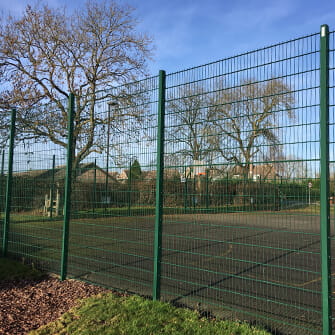Our other sites:
Why perimeter fencing for schools is important
Last week, there were two shocking cases of criminal attacks on schools reported in the media: Woodlands School in Whitleigh, an additional-needs facility, was subject to burglary and vandalism; and Barndale House School in Alnwick was targeted by vandals. In both cases, concerns were raised over the lack of protection along the school perimeter.
But securing a school perimeter isn’t just about stopping crime – there are other important reasons for implementing a comprehensive perimeter security strategy. Protecting against noise pollution, creating a healthy learning environment, enhancing aesthetic appeal and, above all, safeguarding children, should be the top consideration for schools.
Build a safe learning environment
Perimeter fencing has a vital role to play in safeguarding students, whether it’s keeping them onsite to protect them from vehicle traffic or preventing passer-by from interacting with them. Installing a quality fencing solution will keep unauthorised visitors (as well as stray animals) away from the playground. Our research into school security found that unauthorised exits are worryingly common, with a third of parents and teachers we surveyed well aware of them occurring at their school.
Access control solutions can also be strategically placed to direct those entering and exiting the school and monitor pedestrian movement more effectively. This can reduce the risk of crime in schools: depending on their location, schools may be vulnerable to theft, vandalism, arson, personal assault or anti-social behaviour.
School grounds protected by secure perimeters and good access control surveillance systems are the foundation of a healthy learning environment, supported by alertness and a coherent awareness of risk management.
Noise and aesthetics
It is often forgotten that perimeter fencing can help to reduce the impact of noise pollution on both the children within, and the wider community outside (which is especially important if the school is in a residential area).
Unfortunately, noise pollution is often overlooked during the design process, even though it has been proven to have a significant impact on health and learning. If noise is a particular issue in a school – for example, if there are large generators within the grounds – then specifiers should consider acoustic fencing, which can help keep classrooms quiet.
Acoustic fencing also helps to improve the appearance of the school site and make it a more positive place to go for pupils, staff and visitors. When specified wisely, it can strike the right balance between projecting a welcoming atmosphere and a secure establishment. Steel security fencing doesn’t have to be ugly either: there are a wide range of elegant styles and attractive colours to choose from.
Specifying school fencing
Schools should take care to prioritise solutions appropriate to their site’s specific risks and challenges. Undertaking a risk assessment should therefore be your first step in putting together your security strategy. This will expose the types of risks to which your school might be vulnerable; this may include theft, vandalism, arson, heavy vehicle flow and accidental injury for younger pupils.
At this stage, it’s important to fully consider the landscape around your site and its exposure to changeable weather conditions. Question whether there are any potential climbing aids, such as overhanging branches and storage bins.
Once you know firmly what your site’s vulnerabilities are, you can investigate solutions that will secure your school now and far into the future.
For more expert advice on choosing the perfect security fencing for your school site, contact us today.
Related Products
Jacksons Fencing have a large range of related products, all complete with our 25 year guarantee. If you cannot find the item you are looking for, please do not hesitate to call our friendly sales team.
Related Content
Top










